Medical research: fighting for advances in medicine and public health
The fight for a more just world necessarily involves battling the grave injustice inflicted by disease and illness. Since the 1970s, medical research has been one of the historic causes taken up by French philanthropy and Fondation de France.
The year that Fondation de France was born, 1969, also saw the creation of the Fondation Antoine Béclère, the first foundation in the field of medicine to operate under our auspices . The Béclére foundation, « whose establishment 50 years ago was at the wish of the children of this pioneer in radiology, today supports research in medical imagery and telemedicine, technologies which are essential to making progress in the field of health care», comments Frédéric Bérard, who heads our Foundations department. It is both a family and a scientific endeavour, one which is emblematic of the work of many of the foundations gathered under Fondation de France’s umbrella. It represents an undertaking with commitment, which is characteristic of all the medical research programmes conducted by Fondation de France. «We target subjects which are both essential and, at the same time, are receiving scant public funding … and we commit ourselves to investing in them for the duration, 20, 30 years, if that’s what it takes, stresses Dominique Lemaistre, director of Patronage. That’s the price to pay in order to achieve advances in medicine and public health policy.»
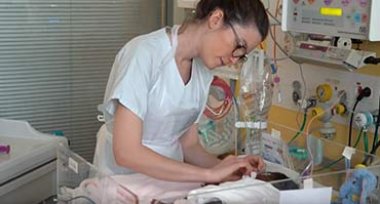
Better care for extremely premature babies, a 50-year-old battle
These days, this battle is largely fought by means of epidemiological studies. Our 2018 Grand Prix for medical research was awarded to Pierre-Yves Ancel and his team for a study which followed a cohort of 4,500 infants who were born prematurely in 2011.
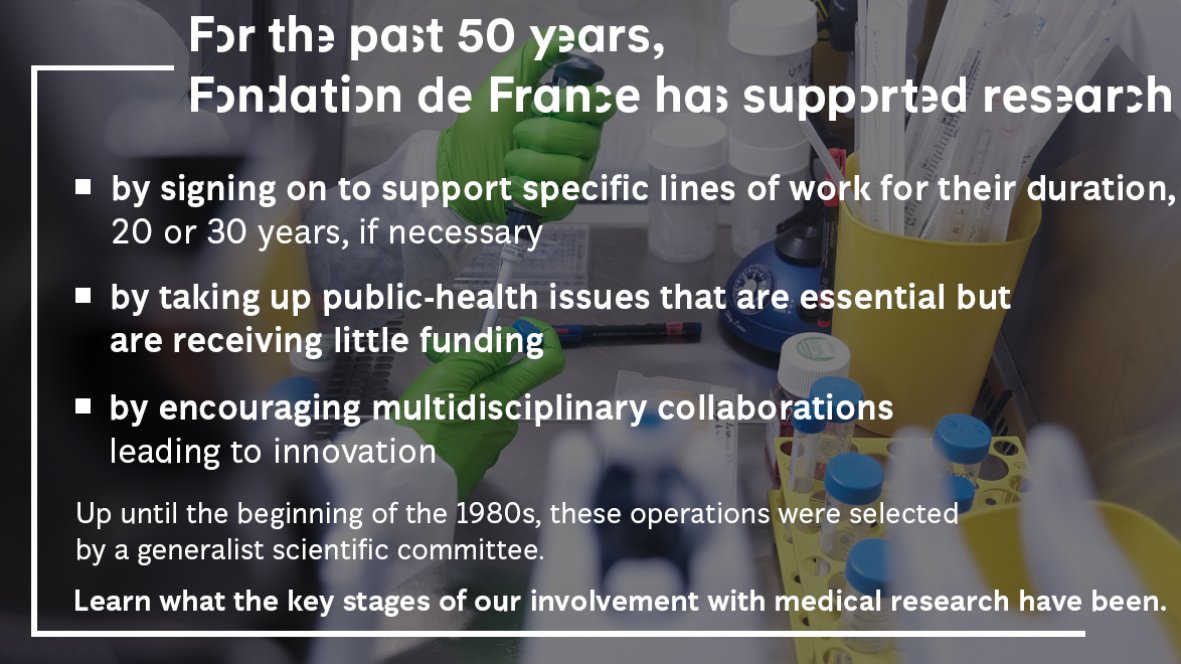
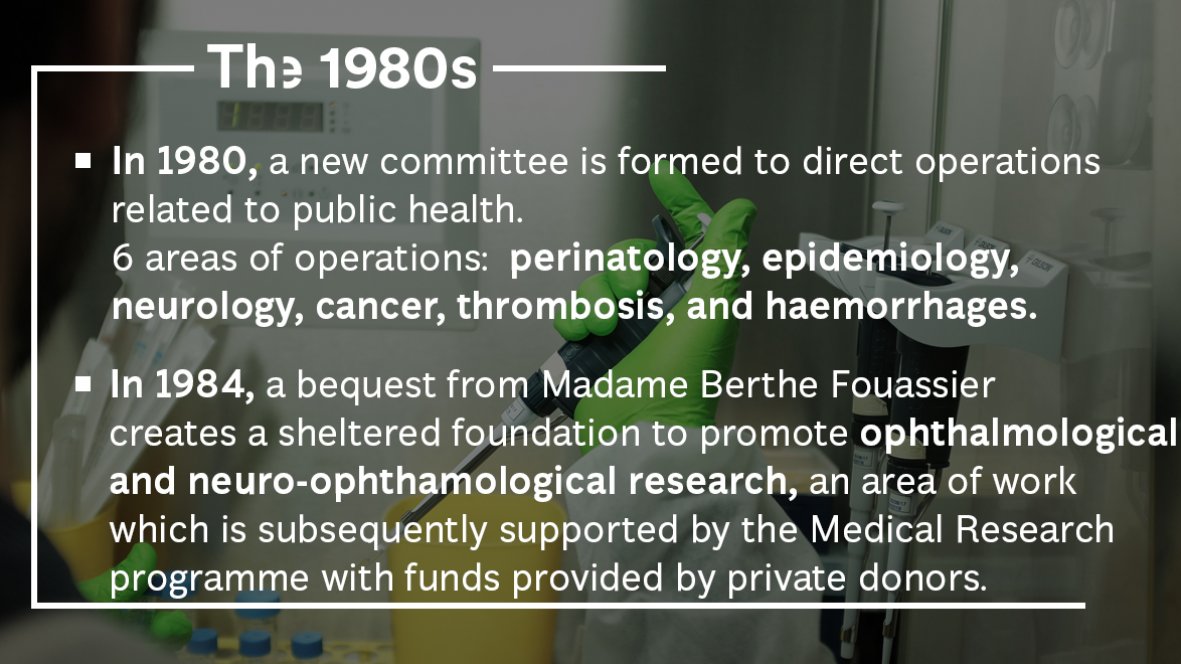
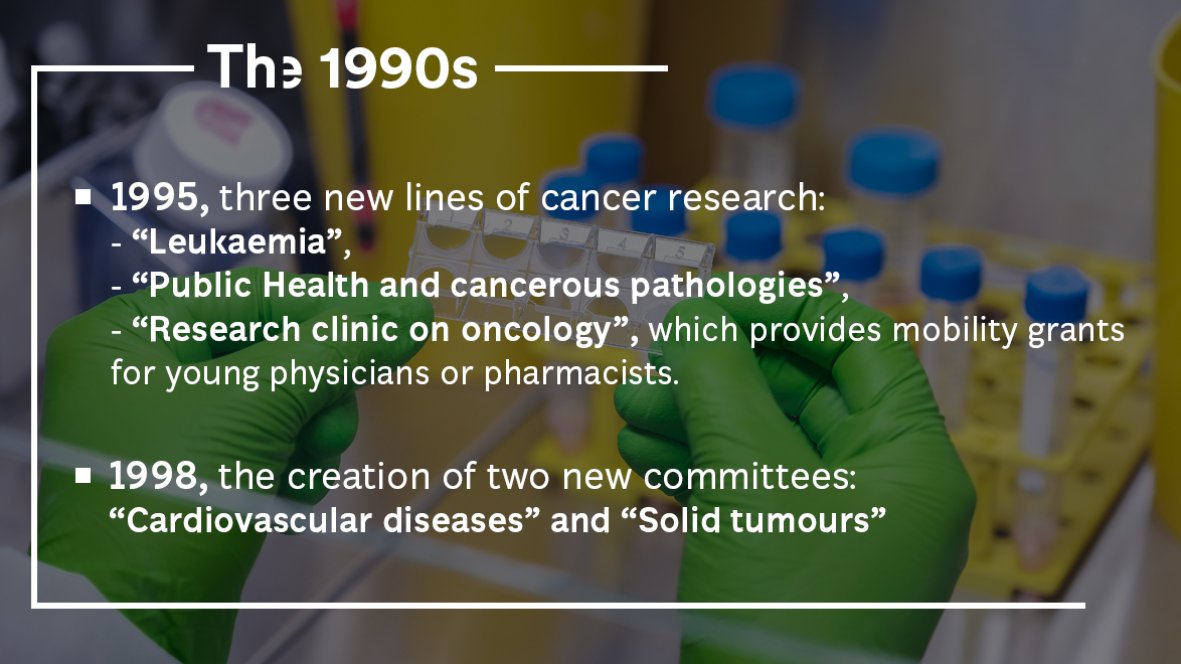
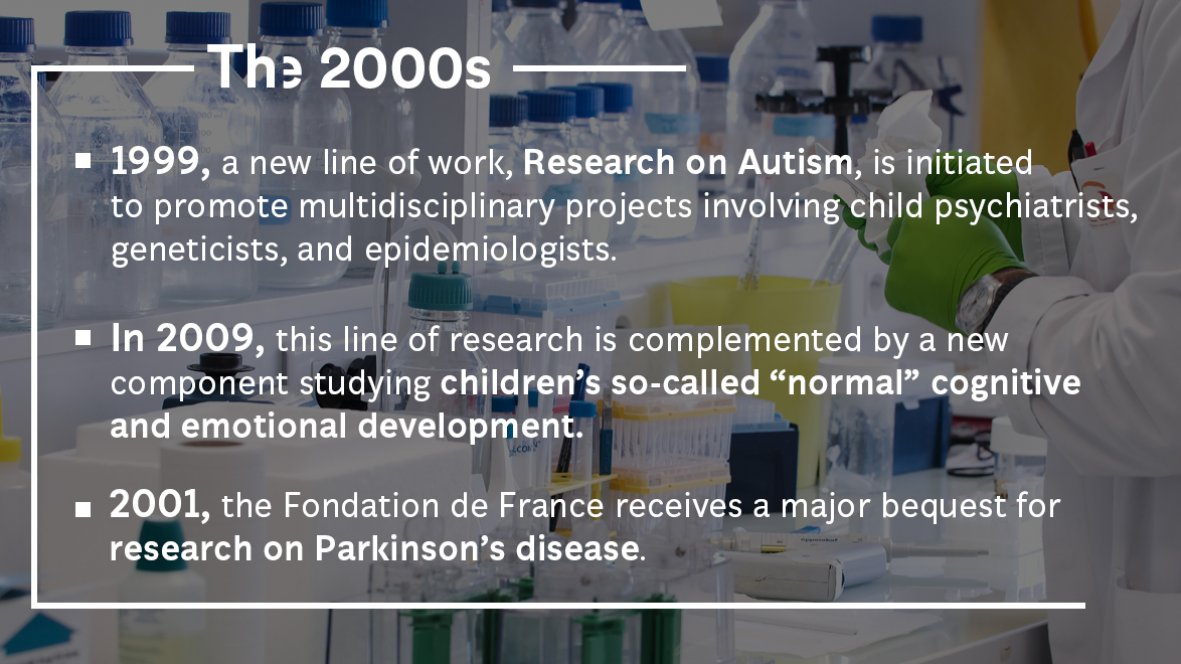
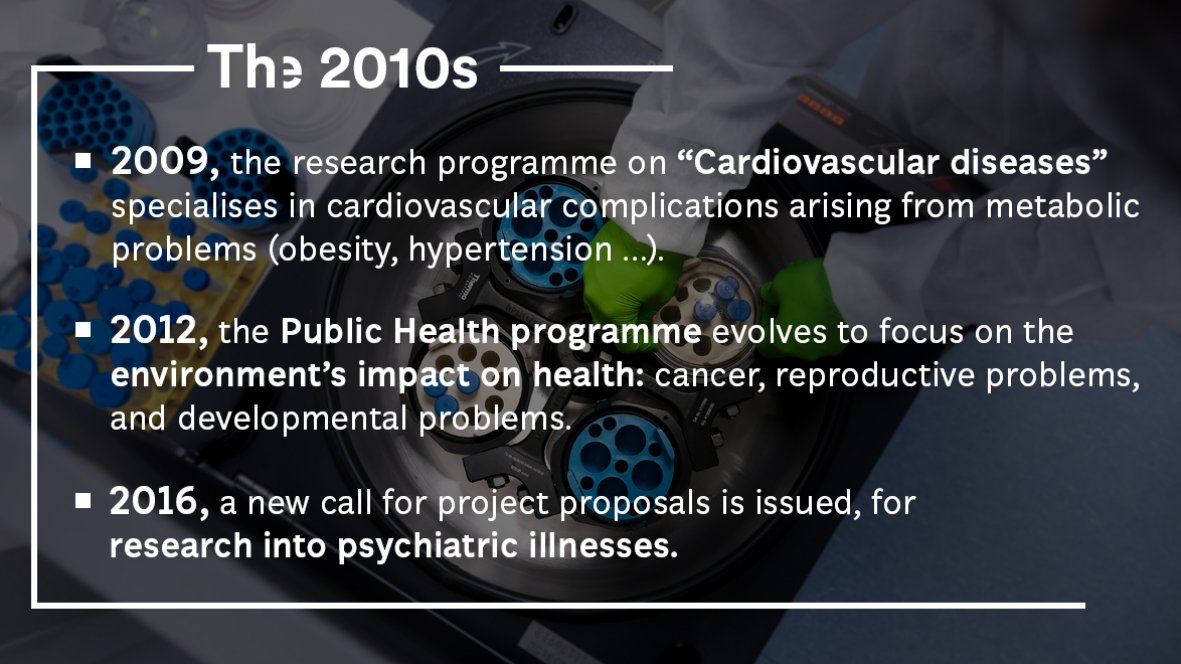
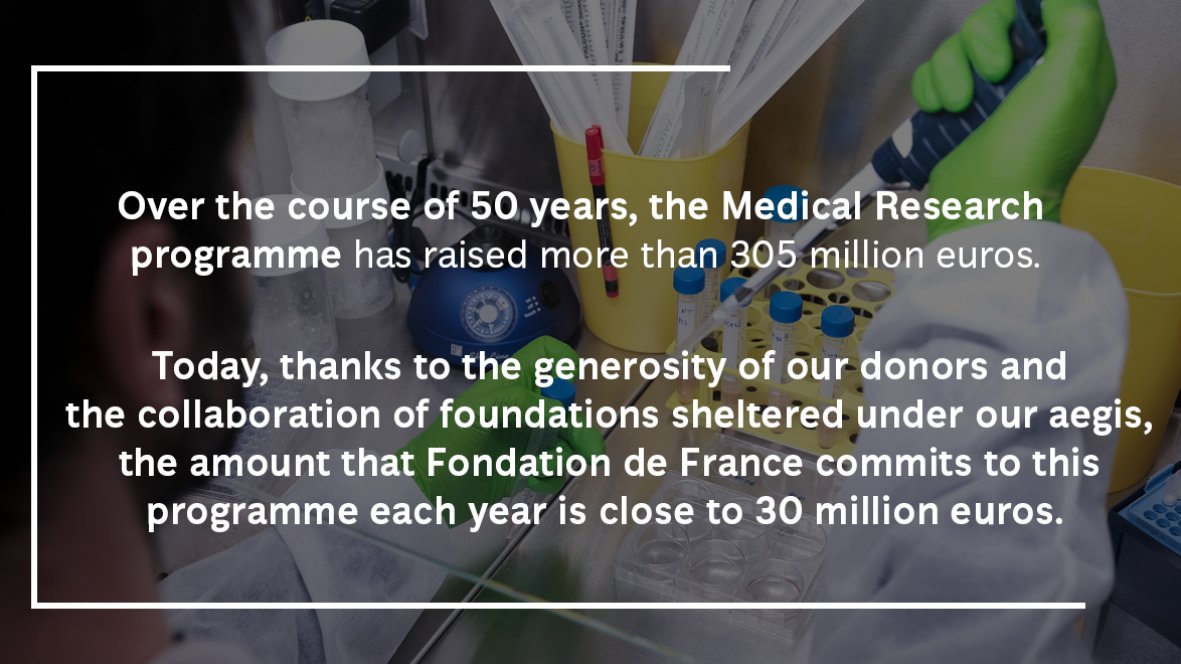
Financing and expertise come together
Overall, our work in the field of medical research encompasses 121 of the foundations operating under our auspices, eight lines of research, two prizes that are awarded each year for a variety of areas of research, as a well as a programme, « Care, alleviation, and support », which sponsors human and social science projects devoted to life-threatening illnesses and end-of-life care.
30 million euros in support of medical research projects in 2018
« This is another field where the work of the sheltered foundations and the work of our programmes are completely interlocking, comments the head of the Medical Research programme, Fanny Herpin. For example, it was the foundation set up by Berthe Fouassier, a generous benefactor motivated by her wish to help fight visual impairment and blindness, which first targeted this problem and which inspired the creation of the “Diseases of the Eye” programme. The experts on our programme councils, in turn, regularly respond to requests to help the foundations in drawing up their calls for project proposals and in selecting the research projects they are going to support. »
Over the course of 50 years, these undertakings have led to decisive advances. For example, in regard to amyotrophic lateral sclerosis, with the Fondation Thierry Latran. The research they have been funding since 2008 has advanced the understanding of the mechanisms at work in that disease (with 84 publications!) and has now led to solid therapeutic hypotheses. Or take the studies of the hepatitis B and C viruses supported by the Fondation Jean Valade… work which is now bearing fruit in the form of a new vaccine.
In the field of medical research, the birth of a new foundation is, sadly, often linked to a family tragedy. That was the case with Patricia and Olivier Blanc, who lost their daughter due to a brain tumour and who founded the Fondation Imagine for Margo. « We discovered that most paediatric cancers are given the same treatments as for adults, just adapted to the weight and the age of the children, explains Patricia Blanc. The foundation allows us to raise funds for European-wide research on more effective and innovative treatments specifically for children. »
Foundation founders with new types of profiles
The past decade has seen the emergence of new kinds of profiles for founders of non-profit foundations. This philanthropic tool, the foundation, is now being employed, for example, by health-care sector professionals. A case in point is that of the hospital pharmacists’ union union which in 2017 set up the Foundation for Research on Hospital Pharmaceutics finances scientific exchanges between different teams of professionals in the French-speaking world, as well as research work, «for example, on the management of risks arising from the use of medical devices (syringes, implants, probes, etc.), or on support for patients and their care-givers in adhering to prescriptions after leaving the hospital, relates the foundation’s president, Patrick Rambourg. Eventually, our goal is to open up a new field of teaching- hospital research, applied to pharmaceutics. »
Among the new types of founder profiles that are appearing are some that are more activist, such as that of Anne Bouverot, the president of the Fondation Abeona. After making her career in the field of new technologies, she decided to devote her energies, her network of contacts, and her resources to research projects on artificial intelligence, especially for the benefit of women. «There are differences: genetic, hormonal, anatomic…Certain diseases affect women more than men. How best to prevent risks, detect illnesses and adapt treatments? How to take advantage of the enormous potential of “big data”, artificial intelligence and other new technologies in order to develop treatments specifically adapted to women? That’s our struggle! » she explains.
The medical research programme: facts and figures
Financed by private donors with further backing from some the foundations that we manage, the Medical Research programme consists of:
Eight lines of work
- cancer: resistance to treatments;
- clinical research on oncology: fellowships abroad for physicians and pharmacists;
- research on cardiovascular diseases;
- research on diseases of the eye;
- research on psychiatric illness;
- research on autism and typical infant neurodevelopment;
- research on Parkinson’s disease;
- public health and the environment.
100 physicians and researchers serving as volunteers on our scientific councils
Preparing the next generation
Lastly, Fondation de France’s efforts in the field of medical research are also reflected in the hundreds of young researchers who have been able to perfect their professional preparation thanks to a stay abroad working at an exceptional laboratory, before returning to France and then sharing and spreading international best practices.
100: the number of young researchers who have benefitted from an international mobility grant.
« My thesis deals with immunotherapy in paediatric cancers», explains Deborah Meyran. «Thanks to the mobility grant from Fondation de France, I worked for two years in Melbourne, Australia. I was able to take part in the ZZC programme –for Zero Childhood Cancer– which develops personalised medicine for children afflicted by cancers with a bad prognosis. When I came back, I rejoined the paediatric oncology service at the Robert Debré Hospital with the purpose of further developing the immunotherapy used for cancers in children. »
In this way, the nine mobility grants awarded each year constitute a contribution to French research, since the intention of returning to France is one of the key criteria in selecting the grantees. The generational changeover is assured!
Making medicine more successful … and more humane
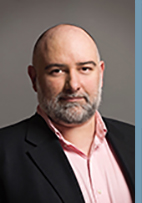 By Antoine Bioy, clinical psychologist and hypnotherapist, member of the Humanisation of Care committee
By Antoine Bioy, clinical psychologist and hypnotherapist, member of the Humanisation of Care committee
Medicine’s technical progress, in everything from diagnostics to treatments, has led to extraordinary therapeutic advances over the past 20 years. These advances have also had two “secondary effects”. First of all, many medical conditions that once were soon fatal have become chronic and we must learn to live with them and their impacts on private, professional, and family life. Secondly, the extreme technicality calls for us to think back on the relationship that is at the heart of care-giving: listening to the patient, the dialogue between the care-giver and the cared-for, the role of those close to the patient …so many emotional and human aspects which form part of the process of care and healing. That’s why Fondation de France has developed a programme that complements research, one centred on the humanisation of patient care.
In order to support the patients, their families, and their care-giving teams, over the past four years this programme has raised 1.6 million euros and financed more than 135 projects. With the guiding principle: put the patient in a position to be an active partner in the therapeutic process.

